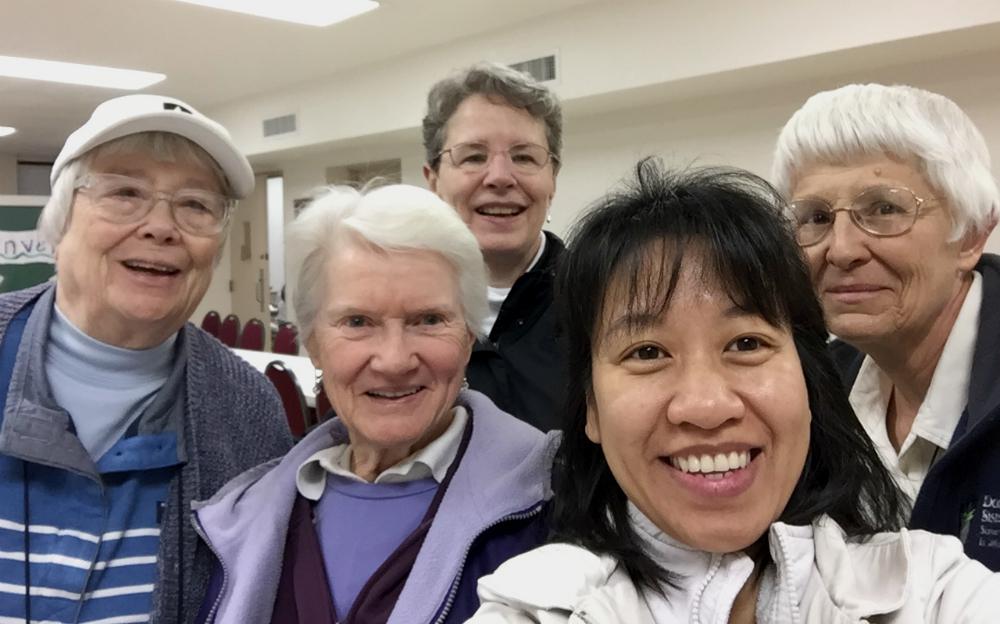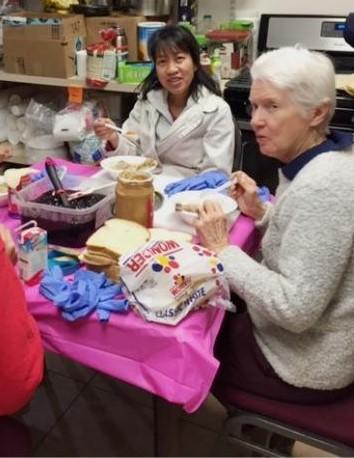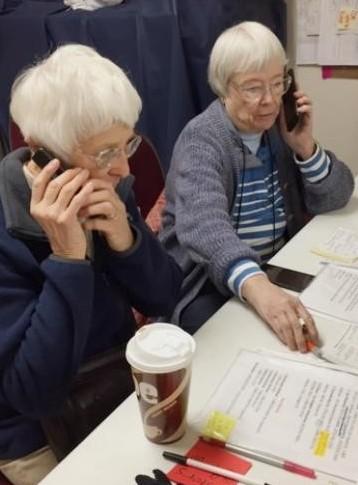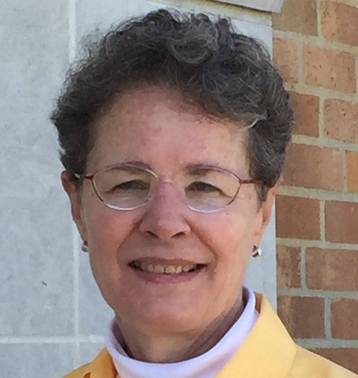
Dominican Sisters of Peace at the border, from left: Doris Regan, Imelda Schmidt, Barb Kane, Mary Vuong and Roserita Weber (Courtesy of Dominican Sisters of Peace, Columbus, Ohio)
The fear of the unknown is a powerful force, and it's easily found as we explore the issue of immigration. Some U.S. leaders and citizens fear that immigrants could be violent, smuggle drugs or compete for jobs. Immigrants fear that they'll be treated harshly or separated from their loved ones. Social service workers and volunteers worry about conditions and whether they’ll be able to make a difference.
Alone or with a partner, consider:
- What is your biggest fear today? To what degree do the opinions and concerns of other people affect your outlook of the thing you fear?
- How can you overcome your fear? Can you do this alone, or could you use help from other people?
How do people in this story overcome obstacles, such as distrust, language barriers and the lack of resources? What can we learn from them?
We met no one to fear at the border
by Barbara Kane
"You'll be OK. I'm with you. Nothing will happen to you." These are the brave words of a tiny 4-year-old boy comforting his favorite toy on the way to his first airplane ride — a ride to a new life in a strange land.
This describes so well the challenging and terrifying experience of many of the refugees we met at the Pastoral Center of the Diocese of El Paso, Texas. As one of the drivers taking them to the bus station and airport, I understood their fear, since many of my passengers had never flown and knew little or no English. I came home convinced that no one would undertake such a challenging trip — especially with their children — if it wasn't absolutely necessary.
Five of our Dominican Sisters of Peace — Imelda Schmidt and Roserita Weber from Kansas, Mary Vuong from Texas, Doris Regan and myself from Ohio — recently returned from El Paso, where we volunteered for two weeks at the Pastoral Center under the direction of Annunciation House.
We had heard much about the "security and humanitarian crisis" on the border, but decided to go anyway. Fortunately, we did not see any drugs, guns or hardened criminals in our hospitality center.
What we saw were mothers and fathers bringing their sons and daughters to the United States so that they could live without the fear of violence or poverty. We saw parents anxious to find work so their children could eat, go to school, grow strong, be healthy and happy, and contribute to their new communities. We met Guatemalans, Brazilians, Hondurans, Salvadorans, Russians and Cubans; all were seeking asylum and working within national and international law governing the right to do so.
Sadly, many who came to us were sick. Most of those who were sick were children, but this was to be expected, given the conditions of the Customs and Border Protection processing centers. We could not understand: Why it was necessary to keep the holding area extraordinarily cold? Why did they put people in cages too crowded for people to sit or lie down? Why were food and water limited? We could only guess at the answers and do what we could to help those who were suffering.
Many of our refugees commented that our smiles and kindness were the first they experienced in the U.S. They appreciated so much being treated with respect.
Sisters Roserita and Doris both speak Spanish and had the opportunity to talk with excited sponsors eager to welcome a friend, cousin, wife or husband to the U.S. These members of extended families were happy to purchase tickets for their loved ones, and intended to continue to help them in the future.
I was particularly touched as I watched a young father braiding his daughter's hair. We watched mothers happily select new outfits for their children, many of whom came with only the clothes on their backs. We laughed as Mary described a young boy holding up a pair of pants to himself as he had seen others doing.

Srs. Mary Vuong and Imelda Schmidt take a break from making peanut butter and jelly sandwiches. (Photo courtesy of Dominican Sisters of Peace, Columbus, Ohio)
The refugees expressed only gratitude, never demanding or expecting more. We were impressed by the generosity of the refugees themselves, who volunteered to work around the center as they waited to leave.
Because we did not speak Spanish, Imelda, Mary and I cooked and served breakfast. On the feast of the Epiphany, we were blessed with a large donation of muffins and pastries. There was a good variety and, after we cut them in half, we put them on the serving line. It was our practice to dish out the meal but we allowed each person to pick out what type of pastry or muffin they wanted.
I noticed the surprise and pleasure on the children's faces as they got to pick out their muffin. It was the first time I realized that "choice" — being able to pick what you want — is a kind of privilege. So many have so little that freedom of choice, even with something as small as a breakfast treat, was a true luxury.
We learned that this project at the border required many volunteers, who came from all over the United States: college students, retired religious sisters and families.
During our first week, we served with a family from St. Louis. Mom grew up in Brazil, Dad was an immigrant from Ireland and the two high school sophomore boys were adopted from Guatemala when they were 3. We bonded with the boys while making hundreds of peanut butter and jelly sandwiches. When I asked why they were taking time out of their Christmas vacation to help at the border, one of the boys told me that they were an "immigrant family" and it was the right thing to do. I suspect that Mom was the real motivation.

Srs. Roserita Weber and Doris Regan make calls to sponsors. (Photo courtesy of Dominican Sisters of Peace, Columbus, Ohio)
Srs. Roserita Weber and Doris Regan make calls to sponsors. (Photos courtesy of Dominican Sisters of Peace, Columbus, Ohio)
The generosity of the citizens of El Paso (many of whom are immigrants themselves) and others who provided clothing and food, transportation and health care was inspiring. It was incredible to watch the sense of community developing among the refugees, with mothers helping other mothers, fathers helping fathers. And together — volunteers and refugees alike — we built a community, even if it was just a temporary one. It was a true demonstration of the human capacity to build bridges, not walls.
Despite the best efforts of some to build fear of those coming to the southern border, we were never afraid. We saw only sincere, hopeful, faithful people. There may be problems with drugs crossing the border, but only an inept businessperson would send such tiny amounts over the border one person at a time. In fact, doesn't the data show that the majority of drug smuggling is occurring at official ports of entry? The U.S. Customs and Border Protection's own statistics confirm the vast majority of heroin, cocaine, meth and fentanyl is smuggled in at legal crossing points in cars, trucks and trains. Fentanyl is mostly sent by manufacturers in China through the U.S. mail.
I agree with the president that there is a humanitarian crisis at the border and throughout the United States. But it comes from vilifying people because of their language, country of origin, or religion. It is not because of those coming for a peaceful life.
It can be solved by recognizing that America is a country of immigrants — a country where many of our ancestors came to escape poverty and persecution. We can continue to be great by being a place of welcome and peace.
In a small group, brainstorm lists of reasons that the migrant people and the sisters had to be afraid of the situation at the border. Then analyze each fear and what it took to overcome it.
The First Letter of John tells us that there’s no room for fear when we choose to love:
"There is no fear in love, but perfect love drives out fear because fear has to do with punishment, and so one who fears is not yet perfect in love. We love because he first loved us. If anyone says, 'I love God,' but hates his brother, he is a liar; for whoever does not love a brother whom he has seen cannot love God whom he has not seen. This is the commandment we have from him: whoever loves God must also love his brother."
- This passage stretches the way we define things such as "love" and "brother." As followers of Jesus, whom do we consider to be our brothers?
- What do you think "perfect love" means and how can we find it?
Pope Francis, who comes from a family of immigrants, has expressed special concern for immigrants.
"Often, however, such migration gives rise to suspicion and hostility, even in ecclesial communities, prior to any knowledge of the migrants' lives or their stories of persecution and destitution. In such cases, suspicion and prejudice conflict with the biblical commandment of welcoming with respect and solidarity the stranger in need."
Message for the 2015 World Day of Migrants and Refugees
- How have suspicion, prejudice and hostility emerged in discussions about immigration?
- Why can it be difficult for immigrants to get their stories heard?
Beyond their ministry to serve migrants at the border, the Dominican Sisters of Peace work for social change by supporting comprehensive immigration reform. Learn more about the congregation's efforts and how to support them here.
Annunciation House, the ministry where the five sisters volunteered, serves migrants and refugees in El Paso, Texas, just 10 blocks north of the Mexican border. It provides hospitality for hundreds of people every week, most of them recently released by ICE [Immigration and Customs Enforcement] including some parents awaiting reunification with their children.
While Annunciation House needs a variety of foods, household items and hygiene products, it mostly needs money. Financial donations let the staff buy exactly what guests need and eases the work and costs of transporting, sorting and storing donated goods. Find out more about how to help Annunciation House here, and consider raising funds for it or another agency helping migrants at the border.
Lord, give us the vision to see through those borders that divide us.
Help us look beyond the untrue or unfair words that distract us from the dignity and needs of people who come to our borders.
Help us to see them as humans to helped, with stories to be heard.
Break down the walls between us and within us, Lord, and help us build bridges to a hopeful future together.
Amen.
Tell us what you think about this resource, or give us ideas for other resources you'd like to see, by contacting us at education@globalsistersreport.org
